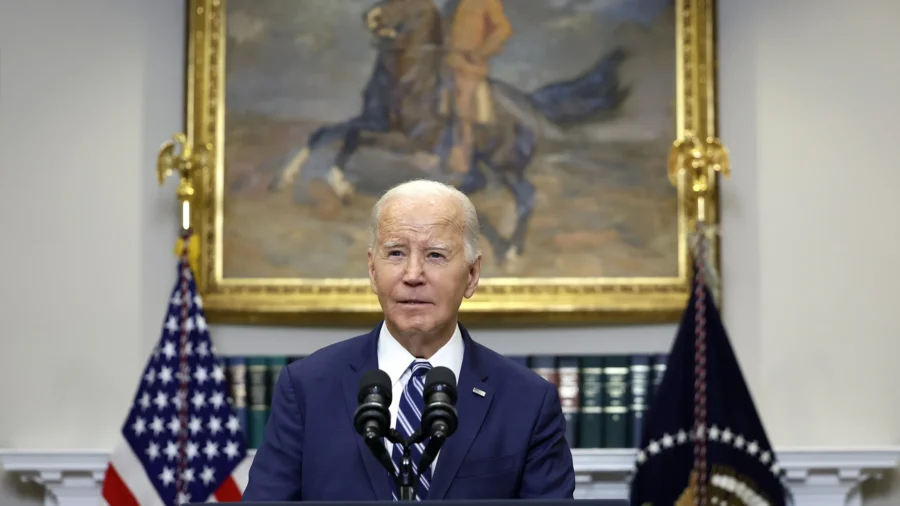The Biden administration is preparing a new round of “major sanctions” against Russia in response to the death of Russian dissident Alexei Navalny in a Russian penal colony last week.
Addressing reporters on Tuesday, White House National Security Council (NSC) spokesman John Kirby announced the Biden administration would reveal new sanctions against Russia on Friday. Mr. Kirby did not offer specifics about the forthcoming sanctions but said the punitive economic measures will coincide with the two-year anniversary of the Russian invasion of Ukraine and will “hold [Russian President Vladimir] Putin accountable for now two years of war in Ukraine, but also specifically supplemented with additional sanctions regarding Mr. Navalny’s death.”
Mr. Navalny, a political candidate and activists who had been a frequent critic of Mr. Putin, was serving a prison sentence in the IK-3 penal colony located in the Arctic Circle when he died on Feb. 16. He had been detained in Russia since January 2021 on allegations he violated the parole terms of prior fraud convictions he had received on allegations he stole donations to various political organizations he was involved with. He was convicted in Russian courts for parole violations and defamation, though he and his various domestic and international supporters insisted the charges were trumped up and part of a retaliation for his open criticism of the Putin government.
President Joe Biden concluded Mr. Putin was ultimately responsible for Mr. Navalny’s death, saying last week, “There is no doubt that the death of Navalny was a consequence of something that Putin and his thugs did.”
Putin spokesman Dimitry Peskov has said Mr. Navalny’s death is being investigated by the Russian government. In comments to Russian state-owned media on Tuesday, Mr. Peskov dismissed allegations Mr. Putin was responsible for the Russian dissident’s death as “absolutely unsubstantiated, boorish accusations.” Mr. Peskov has also rejected calls from the European Union for an independent investigation of Mr. Navalny’s death.
“Whatever story the Russian government decides to tell the world, it’s clear that President Putin and his government are responsible for Mr. Navalny’s death,” Mr. Kirby told reporters on Tuesday.
Mr. Kirby said the U.S. Embassy in Moscow “has been engaged” in efforts to understand the circumstances of Mr. Navalny’s death but said, “It’s difficult to get to a point where you can be confident in what the Russians would say about his death.”
Mr. Kirby said that “regardless of the actual scientific answer” on the precise cause of Mr. Navalny’s death, “Mr. Putin is responsible for it.” Nevertheless, the White House spokesman said the Biden administration would continue to call for “complete transparency” from the Russian government regarding Mr. Navalny’s death.
Putin Critics Propose News Punishments
Some commentators have suggested one new way the U.S. government could punish Russia for Mr. Navalny’s death would be to declare the Russian government a state sponsor of terror. Sen. Lindsey Graham (R-S.C.) has endorsed the idea of attaching a terror sponsor label on the Russian government.
Mr. Kirby did not say whether the Biden administration is currently considering labeling Russia as a state sponsor of terror as part of any forthcoming sanctions.
“I think you’ll see on Friday we’re going to ramp up that pressure on Russia. But I don’t have anything to announce or to speak to with regard to the state-sponsored terrorist designation,” he said.
In an address before the EU Foreign Affairs Council on Monday, Mr. Navalny’s widow, Yulia Navalnaya, called on the international community to refrain from recognizing Russia’s upcoming presidential elections as legitimate.
“I don’t have anything for you on that,” Mr. Kirby said, when asked if the Biden administration was considering not recognizing the results of the March 15–17 elections.
Mr. Putin is running against three challengers in the upcoming presidential election: Nikolai Kharitonov of the Communist Party of the Russian Federation, Leonid Slutsky of the Liberal Democratic Party, and Vladislav Davankov of the New People Party.
Russia’s Central Election Commission disqualified three other presidential candidates: Sergey Malinkovich of the Communists of Russia party, Boris Nadezhdin of the Civic Initiative party, and Yekaterina Duntsova. Because their respective parties are not currently represented in Russia’s parliament, Mr. Malinkovich and Mr. Nadezhdin were required to gather 105,000 valid signatures supporting their candidacy. Mr. Malinkovich and Mr. Nadezhdin both collected the requisite signatures, but Russia’s Central Election Commission (CEC) ruled thousands of these signatures were invalid. The CEC denied Ms. Duntsova’s application for candidacy over issues like spelling errors in her paperwork.
Recent Russian public polling had indicated Mr. Nadezhdin held the support of around 7 percent of the electorate, while his team asserted support had risen as high as 10 percent of the electorate. Those numbers would have placed Mr. Nadezhdin in second place behind Mr. Putin, who is seeking a fifth six-year term.

